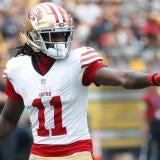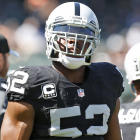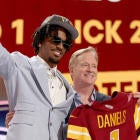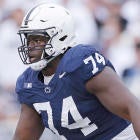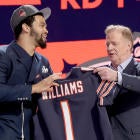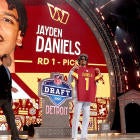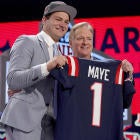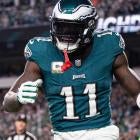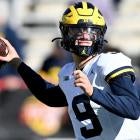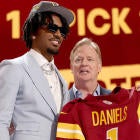The Raiders hit the jackpot in the 2014 NFL Draft. Defensive end Khalil Mack, quarterback Derek Carr and offensive guard Gabe Jackson, all foundational pieces, were selected in the first three rounds. Carr and Jackson were given top-of-the-market contract extensions last offseason, when they were entering the final year of their rookie contracts.
The expectation was the Raiders would do the same thing with Mack, who is scheduled to make $13.846 million on his fifth-year option. Signing Mack long-term in 2018 seemed to be general manager Reggie McKenzie's plan during the middle of the 2017 season. At the time, McKenzie said, "I anticipate that. Yes I do. Hopefully his agent feels the same."
Joel Segal, Mack's agent, is a shrewd negotiator. He doesn't have a reputation of being particularly difficult in his dealings with teams even though he navigated running back Chris Johnson through a successful holdout in 2011 that lasted until the Titans gave his client a four-year, $53.975 million contract extension in early September. Segal has gotten deals done extremely early with first-round picks under the rookie wage scale. He made Cardinals cornerback Patrick Peterson the NFL's highest-paid cornerback in 2014 after his third NFL season. He also got the Rams to grossly overpay wide receiver Tavon Austin on a four-year extension in 2016 averaging approximately $10.5 million per year with two years remaining on his rookie contract.
It had been a foregone conclusion that Mack would have become a charter member of $20 million-per-year non-quarterback club by now. Instead, Mack is one of three veteran players under contract who are holdouts. NFL Media's Ian Rapoport reported during his recent visit to Oakland's training camp that there haven't been contract discussions since February and the Raiders don't currently have an offer on the table for Mack. McKenzie refused to negotiate with left tackle Donald Penn last year while he was holding out. Penn signed a new deal shortly after ending his holdout.
So what's changed? Jon Gruden came out of the Monday Night Football broadcast booth after a nine-year hiatus to return to coaching armed with a 10-year, $100 million contract from Raiders owner Mark Davis. It's pretty clear with the type of money Gruden is getting that he is the main power broker in the Raiders organization, although McKenzie retained the title of general manager. Gruden probably didn't do himself any favors with Mack and his agent by gratuitously commenting at the start of training camp that Oakland's defense wasn't very good last year with the 2016 NFL Defensive Player of the Year on the field.
Desperately wish you had a 30-minutes-or-so, daily NFL podcast in your podcast app every morning by 6 a.m.? Put some Pick Six Podcast in your life and join Will Brinson as he breaks down the latest news and notes from around the league, as well as the win totals on a team-by-team schedule. It's a daily dose of football to get you right for that commute or gym trip. Subscribe: via iTunes | via Stitcher | via TuneIn | via Google Play
The holdout isn't surprising considering Oakland's previous treatment of Mack's fellow 2014 picks, Carr and Jackson, and an unwillingness to engage in negotiations. Mack appears to be firmly entrenched in his position despite being subject to a fine of $30,000 for each missed day of training camp and one week's base salary ($814,471) with each preseason game he misses.
The Rams have taken a different approach with All-Pro interior defensive lineman Aaron Donald, who is holding out for a second-straight year. The lines of communication have remained open with a more conciliatory tone during this contract stalemate. There is some light at the end of the tunnel with Donald, the reigning NFL Defensive Player of the Year. Rams general manager Les Snead indicated last week that the parties were in the same "zip code."
The Rams are reportedly willing to make Donald the NFL's highest-paid non-quarterback, which is currently Broncos outside linebacker Von Miller at $19,083,333 per year and $70 million in overall guarantees, by breaking the $20 million per year barrier. It is my understanding that at least restoring the traditional financial relationship between the highest-paid quarterback and non-quarterback, which existed under the current Collective Bargaining Agreement before salaries for passers dramatically increased over the last year, has been important to Donald's camp. A deal averaging more than $23 million per year with $85 million in guarantees where $65 million to $70 million is fully guaranteed at signing would recreate the balance. Donald's new deal should serve as a baseline for Mack if and when negotiations eventually resume.
The dynamics have prompted speculation about the Raiders trading Mack, with sports books beginning to take odds on where he will play this season. Mack hasn't indicated that he wants out of Oakland and the Raiders have no plans to trade him at this time.
Trade compensation
The Raiders should be able to command a king's ransom if Mack is put on the trading block. I asked former longtime Eagles president and Browns CEO Joe Banner via direct message on Twitter about the type of compensation the Raiders could get in a Mack trade. The Eagles were considered as a team to emulate in salary-cap management under Banner's direction.
"I think the range is a 1, 3 and 7 on the low end to two 1s on the high end. A lot also depends on how high the 1 is. Maybe it's a 1 and 2 if it's fairly high, or two 1s if it's lower," said Banner. "Maybe a team would be smart to include a 1 with a quality player. Or a 1, a middle pick and a quality player. He (Mack) is as good or better than any of the players we have seen involved in these kind of trades."
Banner's assessment is consistent with the top trade compensation for veteran non-quarterbacks during the 21st century, which is outlined in the chart below.
| Player | Position | Year | Old team | New team | Compensation |
|---|---|---|---|---|---|
RB | 2002 | 2002 first-round pick (25th), 2003 first-round pick (18th), swap of 2002 fourth-round picks | |||
WR | 2000 | Two 2000 first-round picks (13th, 27th) | |||
Joey Galloway | WR | 2000 | 2000 first-round pick (19th), 2001 first-round pick (7th) | ||
DE | 2008 | 2008 first-round pick (17th), two 2008 third-round picks, swap of 2008 sixth-round picks | |||
Roy Williams | WR | 2009 | Cowboys | 2009 first-round pick (20th) third- and a sixth-round picks, 2010 seventh-round pick | |
WR | 2013 | Vikings | Seahawks | 2013 first-round pick (25th) and seventh-round pick, 2014 third-round pick | |
OT | 2009 | Eagles | 2009 first-round pick (28th), and fourth-round pick, 2010 sixth-round pick | ||
Randy Moss | WR | 2005 | Vikings | Raiders | 2005 first-round pick (7th), seventh-round pick and LB Napoleon Harris |
CB | 2013 | Jets | Buccaneers | 2013 first-round pick (13th) and 2014 fourth-round pick |
It's been more than 15 years since two first-round picks were given up for a non-quarterback. In each case, the trade involved an offensive skill-position player. Jared Allen may be the most relevant because he was also a defensive end like Mack. He had been given a franchise tag by the Chiefs, while Mack is in his contract year.
Trade logistics
A team must have enough salary-cap room to absorb a player's current salary in order to make a trade. Once the player is acquired, the new team can renegotiate or restructure his contract to increase/decrease his cap number and/or salary.
Teams aren't allowed to include cash or cap room in trades under NFL rules. The way around it, which probably wouldn't be applicable to Mack, is for the team and player to restructure the contract before the trade by converting salary into signing bonus. This was done when the Jaguars traded Eugene Monroe to the Ravens in 2013. It operates essentially the same way as including cash or cap room because the acquiring team's cap hit for the player in the current league year is reduced. Eating salary in this manner could be a way for the Raiders to increase to the compensation received for Mack.
The Raiders would probably need to grant permission to a team seriously interested in acquiring Mack to discuss to new contract with Segal prior to finalizing a trade. Presumably, a new contract would make Mack the NFL's highest-paid non-quarterback. It would be smart for any team making the trade to have a new deal in place or at a minimum establish salary parameters and a structural framework for a deal.
This happened during my agent days when I was helping represent three-time Pro Bowl cornerback Patrick Surtain. The Dolphins gave us permission to negotiate a new contract when the Chiefs expressed interest in acquiring Surtain prior to the 2005 draft. We had a deal in place with the Chiefs before the two teams were able to agree on trade compensation. New contracts were also a part of the process in each of the trades in the chart, except for Randy Moss.
Potential teams
Below are five teams with a pass-rushing need that can absorb or get in a position to accommodate Mack's $13.846 million 2018 salary. The Giants, who tied for 29th in sacks last season with 27, are not included because of a tight salary-cap situation. Creating cap room through an Odell Beckham, Jr. extension wouldn't put the Giants in position to get Mack. The Giants are last in the NFL with just under a $1 million of cap space.
Fines for missing training camp would no longer be enforceable after a trade because of a 1997 arbitration decision involving Kevin Greene. The Greene precedent means that Oakland wouldn't be able to collect any of daily fines Mack racked up or the weekly salary penalty for his absence from training camp if he's with another team provided he doesn't end his holdout until dealt.
 Green Bay Packers
Green Bay Packers
On the surface, the Packers are a logical destination. Outside linebacker Clay Matthews, 32, is in a contract year and hasn't had a double-digit sack season since 2014.
McKenzie has a great relationship with the Packers. He spent 18 years as a scout and front office executive in Green Bay prior to becoming Raiders general manager in 2012.
The Packers are the only team with two first-round picks in the 2019 draft. In addition to their pick, the Packers have the Saints' pick that was traded during this year's draft. The picks are expected to be near the bottom of the first round since both teams are considered playoff, if not Super Bowl, contenders.
The Packers have just over $11 million of cap space so a contract restructuring or two would be necessary unless a player was a part of the trade. For example, including Matthews should allow the Packers to retain one of the 2019 first-round picks. Gruden's affinity for older players dates back to his days when he was essentially calling the shots with the Buccaneers after winning a power struggle in 2003 with Rich McKay, who had been general manager for 20 years. Seasoned veterans, such as wide receiver Jordy Nelson and inside linebacker Derrick Johnson, were among Gruden's biggest free-agent acquisitions this offseason. Both players are older than Matthews. The Packers would be picking up $10,837,500 of 2018 salary cap room from dealing Matthews, which would leave right around $8 million of space after getting Mack.
Green Bay would become very top heavy financially. Quarterback Aaron Rodgers has been negotiating an extension that will make him the NFL's highest-paid player if an agreement is reached. Mack would likely set the standard for non-quarterbacks with a new deal.
 Buffalo Bills
Buffalo Bills
General manager Brandon Beane and head coach Sean McDermott haven't been shy about making trades since taking over in 2017. Mack would be returning to the city where he played his college football with a trade to Buffalo. He is currently working out in Buffalo during his holdout.
The Bills had trouble getting the quarterback last season. Defensive ends Jerry Hughes and Shaq Lawson led the Bills with four sacks apiece.
The Bills are approximately in the same cap position as the Packers with just under $11 million of room. A change of scenery might do Lawson, a 2016 first-round pick, some good. Lawson has been a disappointment and Beane/McDermott aren't invested him since he predates their arrival in Buffalo.
Approximately $1.4 million of cap room would be gained from trading Lawson, which wouldn't quite give Buffalo enough for Mack's 2018 salary. Lawson is under contract through the 2019 season for just under $3.25 million with a fifth-year option in 2020 that can be exercised.
 Indianapolis Colts
Indianapolis Colts
Cap room isn't an issue for the Colts. Only the Browns have more than Indianapolis' almost $51 million of cap space. Mack would give the Colts the consistent pass-rushing threat that's been missing since Robert Mathis led the NFL with 19.5 sacks in 2013. The Colts have an extra 2019 second-round pick from the trade with the Jets, who moved up to the third-overall pick in this year's draft to take USC quarterback Sam Darnold.
 New York Jets
New York Jets
Mack would leave the Jets with approximately $1.5 million of current cap space. The Jets are in a great cap position next season. With 45 players under contract, they have the league's fewest 2019 cap commitments at just under $109 million. The Jets don't have to worry about having a high-priced quarterback anytime soon. The fully-guaranteed four-year rookie contract Darnold signed a couple of weeks ago is worth a little less than $30.25 million. The Jets probably wouldn't be picking until the third round in next year's draft because the Raiders would surely insist on a first-round pick in 2019 instead of 2020 in any deal for Mack. The Colts own the Jets' 2019 second pick.
 Chicago Bears
Chicago Bears
The Bears haven't had a dominant pass rusher from the edge since future Hall of Famer Julius Peppers was released after the 2013 season. Peppers played in three Pro Bowls during his four seasons in Chicago. Adding a top-of-the-market defensive-player contract isn't a problem for the Bears, since quarterback Mitchell Trubisky is in the second year of a fully-guaranteed four-year rookie contract totaling just over $29 million. The Bears are one of six teams with more than $25 million of existing cap space, with approximately $26.15 million of room.
Final thoughts
The Raiders run the risk of creating a new blueprint for how not to handle a superstar player. Banner had a couple of other interesting observations regarding the Mack situation. "I'm not sure the Raiders appreciate the mess they have created," he said. "If he sits some of this year, how do they tag him? Tie up $19M and don't know if he will even show. He has more value right now then he will in the future in a trade. I think he is a superior player at the second-most important position in the game."
Mack's market will be well-defined if Donald and the Rams come to an agreement. He is precisely the type of player a team should be looking to sign long-term. At that point, the Raiders should enter into good faith negotiations with Mack regardless of whether he ends his holdout.
An offensive coach by trade, Gruden may have taken note that the massive contracts given to defensive tackle Ndamukong Suh and Miller by the Dolphins and Broncos in 2015 and 2016, which made them the NFL's two highest-paid non-quarterbacks, haven't translated to wins. The Dolphins made the playoffs only once (2016) as a wild card during Suh's three years in Miami before releasing him in April. Their regular-season record was 22-26 with Suh on the roster. The Broncos have missed the playoffs in both seasons and are also under .500 since Miller received his contract.
The Raiders should probably adopt the approach Patriots head coach Bill Belichick took with edge-rusher Chandler Jones in 2016 and wide receiver Brandin Cooks this year, if Gruden and/or Davis aren't comfortable with Mack becoming the league's highest-paid non-quarterback. Both players were traded at the beginning of their fifth-year options because of signability. Belichick wasn't willing to pay the premium that good, young pass rushers command with Jones, or to pay Cooks after the explosion of wide receiver salaries in free agency. He dealt them rather than deal with the potential distraction that playing the franchise-tag game could have created.
Mack's situation is likely to become more acrimonious the longer it goes. Nonetheless, the chances of Mack sitting out the 2018 season are remote. It would be counterproductive contractually. Oakland would likely have Mack's contract tolled for a full year under the extension provisions in paragraph 16 of the standard NFL player contract thanks to an arbitration decision relating to Joey Galloway's 101-day holdout in 1999. This would mean Mack's deal wouldn't expire until after the 2019 season instead of the 2018 season.
Seattle lost a grievance attempting to get Galloway's contact extended for an additional year under paragraph 16 because he held out for the first nine weeks of the 1999 season. The arbitrator didn't give a clear standard for how many missed weeks are necessary to trigger tolling.
It is the NFLPA's belief that the deadline for teams to sign their unsigned franchise and transition players, draft picks and restricted free agents, which is the Tuesday following the 10th week of the season, also applies to holdouts. After this date, which is Nov. 13 this year, these players are prohibited from playing for the rest of the season. It remains to be seen whether returning at this deadline would be sufficient to prevent a contract from tolling.
Gruden should really consider whether he wants a disgruntled Mack in the locker room if he ends his holdout while still under his rookie contract. Based on conversations I've had with several prominent agents, there is probably going to be some player, not necessarily Mack, in the not-too-distant future who is strategically disruptive (falling short of a suspension for detrimental conduct) in a contract year or upon return of holdout to try to dissuade his team from designating him as a franchise player the following year. The agents considered it merely using the tools at their disposal under the NFL CBA, just as teams do with players.







